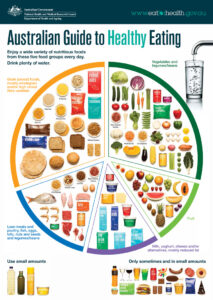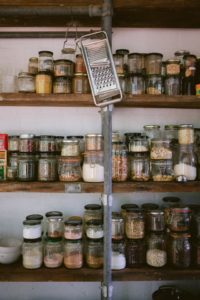
How to Buy Food for a Healthy Diet
I’m often asked how someone can improve their health and wellbeing through eating good food. A healthy eating plan starts in the kitchen. You need to have healthy food in your fridge and pantry so you can quickly prepare a healthy meal and not be tempted to make poor food choices.
Start with a Meal Plan
Before you do your weekly shop write down a meal plan. This doesn’t have to be a complicated, “set in stone” meal plan. You can outline what you think you will be eating and write a list that fits that broad plan. The best type of meal plan is a flexible one.
When shopping for food choose:
- Nutrient dense foods
- Wholegrain foods that have minimum processing e.g. whole wheat, brown rice, oats, wholegrain breads and cereals. Highly refined grains that have been enriched still do not compensate for the nutrients lost in processing.
- Dried beans/pulses like borlotti beans, chickpeas, black beans, lentils and moong dahl. Dried beans can be soaked overnight and cooked the next day. Beans/pulses are a great source of protein and fibre, which helps slow glucose absorption and keeps blood glucose levels stable. Dried beans/pulses can be used to make lots of delicious meals e.g. beans and rice, and dahl, or pulses can be added to a meat based casserole. Canned beans and pulses are an alternative for those who prefer not to cook their own.
- Fresh fruit and vegetables over processed ones (dried, canned, frozen, juices, and juice drinks). It’s ok to have some frozen fruit and vegetables in the freezer for when you run out of fresh produce, however, remember fresh really is best. Select a variety of vegetables from the leafy green, red, orange and yellow groups.
- Meat, poultry, fish that is low in visible fat.
- Low fat (not no fat) dairy products – milk, cheese, yoghurt, soy products.
- A variety of foods from all food groups.
Read the food label so you know:
- The calorie/kj content of a standard serve of that food.
- What other nutrients are in the food – look out for:
- fibre content,
- sugar (including corn syrup, honey, molasses, fruit juice concentrate),
- saturated fats & trans fats,
- salt,
- added nutrients,
- flavours & colours (natural & artificial).
- Be wary of anything labelled ‘light’, low fat, low salt or low/no cholesterol. What else is in the food? e.g. many low/no fat foods are high in sugar.
Want to know how to improve the role food has to your overall health and wellbeing? Book an appointment with me – see Bookings page.



